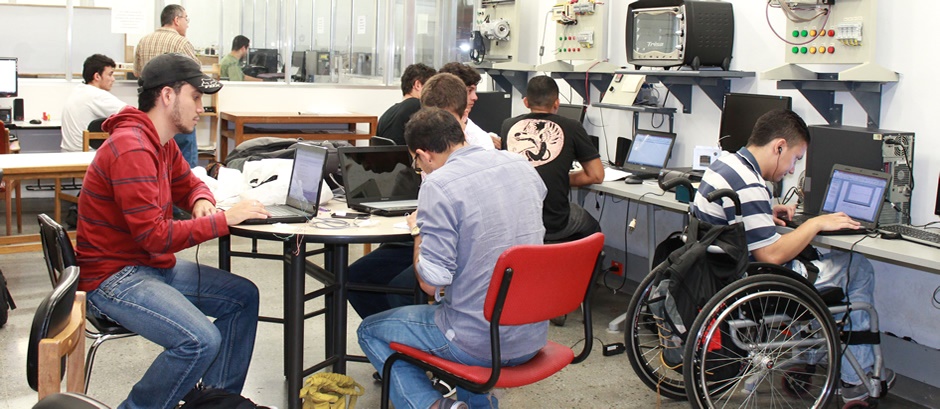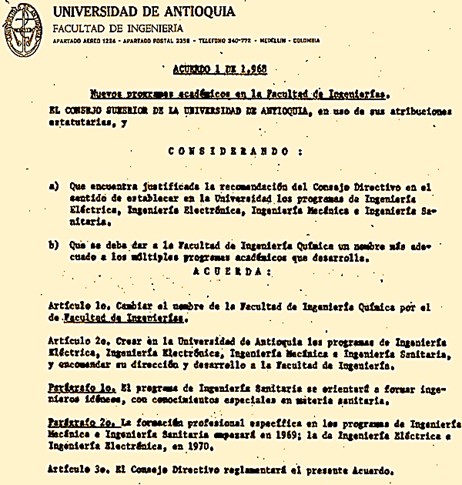 Portal U de A - Cabezote - WCV(JSR 286)
Portal U de A - Cabezote - WCV(JSR 286)
 Signpost
Signpost
Ingeniería Eléctrica
 Portal U de A - Visor de Contenido - WCV(JSR 286)
Portal U de A - Visor de Contenido - WCV(JSR 286)
 Portal U de A - Visor de Contenido - WCV(JSR 286)
Portal U de A - Visor de Contenido - WCV(JSR 286)
 UdeA - Información Menú - WCV(JSR 286)
UdeA - Información Menú - WCV(JSR 286)
About the program

Mission
To train engineers with academic excellence, autonomous, ethical, and esthetical criteria, to participate through research and the application of their skills in solving problems in the society, particularly those related to conception, implementation, and operation of efficient electrical systems with a holistic, universal, and interdisciplinary vision of phenomena and respect for the environment.
Vision
Universidad de Antioquia Electrical Engineering program will be recognized for its contributions to the efficient management of electrical energy in the region and the country, manifested in the training of entrepreneurial engineers, in research, innovation, and development projects.
Education Objectives (Proposed)
- To train future electrical engineers as capable of interpreting, modeling, simulating, analyzing, and solving electromagnetic phenomena related to the generation, transmission, distribution, and efficient use of electrical energy, as well as to develop a technological prospect for the appropriation, implementation, and development of sustainable, safe, and reliable electrical systems.
- To promote autonomous learning of complementary topics in the training of electrical engineers with technical, scientific, and innovative criteria, which allow the analysis and resolution of problems, and the application of electrical engineering concepts.
- To train citizens with ethical values, social responsibility, honesty, and with criteria of academic excellence, critical spirit, autonomy, respect for the environment, and responsible for their work.
- To promote interdisciplinary teamwork in students, in addition to adaptation to change, inclusion and respect for the difference, as well as the appropriation and use of technological tools for problem solving.
- To train new professionals with normative criteria for the exercise of their profession, with the ability to argue their ideas clearly and precisely, to contribute to the solution of society's problems.
Learning Outcomes (Proposed)
- To appropriate and apply investigative, technical, technological, environmental, legal, economic, and financial knowledge, for the generation, transport ,and use of electrical energy.
- To promote the generation, transport, and use of electrical energy, in an adequate, sustainable, and efficient way, considering new technologies for its exploitation.
- To develop and apply strategies, projects, and methodologies for the design and implementation of URE programs.
- To lead working groups for the planning, application, and development of electrical engineering projects.
- To apply their professional skills with the greatest humanistic, ethical, and moral sense, safeguarding the cultural, social, and environmental patrimony of the country.
- To plan, design, operate, test, and maintain electrical systems in a safe way (for people, environment, and equipment).
- To develop business capacity to enable companies’ creation and their development.
- To evaluate and apply current legislation for the design and efficient use of electrical systems from the exploitation of non-conventional sources of energy.
- To plan, design, and operate electricity generation projects with renewable energies, in order to contribute to the commitments acquired at the United Nations conference (COP21).
- To fluently communicate in Spanish and English, in order to appropriately interact with society in a critical and purposeful way.
Program history
The Electrical Engineering program was created in 1968, as part of the Faculty of Engineering, as an undergraduate program that would be at the forefront in the applications of electricity at an industrial and residential level, seeking to strengthen the new fields of action attributed to the developments of the electricity.
It should be remembered that in 1960, the projects generation of the Central Laguneta (1960), fourth unit, were inaugurated in Colombia; Central Turbogas Cospique (1960); Yumbo Thermoelectric Plant (1962); Thermopiza I (1963); The Jump II (1963); The Esmeralda (1963); Paipa I (1963); Troneras (1965), and Calima (1967). In addition, in 1966 the "Agreement on the Interconnection of Electrical Systems and Expansion of Generating Capacity" was signed by Empresas Públicas de Medellín (EPM), Empresa de Energía de Bogotá (EEB), Electraguas and the Corporación Autónoma Regional del Cauca. The above, in addition to the development of the State of Antioquia (which by 1964 had a population of close to 2.5 million inhabitants), which caused a great demand for energy to strengthen all the fields of action that this new workforce could have, which began to leave the countryside and came to the city in search of new opportunities.
Specifically, the program was created together with other undergraduate programs: Mechanical Engineering, Sanitary Engineering, and Electronic Engineering, to solve the different needs of the local and regional environment, such as:
- Growth of the medium-sized industry in Medellín in textiles, foundries, chemicals, and food, among others.
- Demographic growth of the State of Antioquia, specifically in those places of influence of the Antioquia Railroad and in the capital city: Medellín.
- Need for an increase in the qualification and occupation rate of citizens.
- An incipient technological development requiring qualified electrical engineers to work on the modernization of industrial facilities and on the implementation of more efficient equipment, seeking for economic and technical alternatives to provide a solution to the development that the country was demanding.
Despite the program had been created in 1968, the Dean of the time, engineer Juan José Echeverri Escobar, requested that the offering of the program started only in 1970, as there were not enough graduates in this area in the city or in the country, because the only university that had been offering the program in Medellín, since 1950, was Universidad Pontificia Bolivariana (UPB), and Universidad Nacional Medellin campus (School of Mines) begun offering this program in 1967.
However, four Electronic Engineering students, who also had start studies in 1968, requested a change of program and it was accepted by the Board of Directors (today called the School Council); reason for which Universidad de Antioquia Electrical Engineering program started in 1969.

The program began with a study plan of approximately 244 credits that mostly covered different areas of engineering, which sought to strengthen the knowledge of future graduates, so that they could obtain jobs in different areas. Furthermore, it is worth remembering that in 1967, Interconectado Eléctrica SA (ISA) company was incorporated, and offered electrical interconnection in different regions of the country, but also was in charge of the new energy generation, transformation, and distribution projects, for which the electrical engineers had to have a broad basis to appropriately perform in different areas.
It should be clarified that, at that time, students had to pass a large number of subjects in mathematics and physics, which allowed that their performance was not affected by the specific field that was demanded. In addition, administrative and socio-humanistic courses allowed them a holistic view of engineering.
In 1976, the first reform of the study plan was submitted. It had 238 credits, and the program focused on the different applications of Electrical Engineering, in addition to communications, an area that began to be strengthened with the sale of the Antioquia Railroad to the Nation, given that the investments that had been made in communications and rural electricity were not sold and Eade and Edatel (Empresa Antioqueña de Energía and Empresa Antioqueña de Telecomunicaciones, respectively) were incorporated. At the same time, due to an academic reform of the entire Faculty, some additional courses in the socio-humanistic area were added, which permeated the graduates with a social and economic awareness.
For 1988, University Academic Council, through Agreement 115, November 17, 1988, approved version 2 of the study plan for those students who had been admitted to the program since 1986 and for future ones. This study plan lasted in its central structure until 2008, when six (6) English levels were added (this change was called version 3). Then, for 2009, version 4 of the curriculum with 198 credits was submitted, which was previously socialized with students, graduates, employers, and the entire community, to update the study plan and focus it on the current applications of electrical engineering, without leaving aside strength in physics and mathematics.
For the year 2016, version 5 of the study plan was approved. It had 179 credits, which arose for three main reasons: the first, was the new approach to electrical systems worldwide that does not deviate from optimal criteria such as the environment, society, finance, economics, politics, and good engineering practices, which is why subjects that responded to these requirements were added, as well as additional topics for other subjects. Second, the criteria that govern good practices in electrical engineering, especially industrial safety and electrical risks. Third, the definition adopted, for the first time, by the Ministry of National Education (MEN), which defined academic credit as the basic unit for measuring academic activities, as follows: 1 credit is equivalent to 48 hours of academic work per term (Education Sector only Regulating Decree No. 1075, May 26, 2015); therefore, since February 2017, there were the first students of version 5 of the study plan. It should be noted that since its creation, and until 2018, more than 1,300 professionals have been awarded their degrees as Electrical Engineers.
On the other hand, the program received its first High Quality Accreditation, for a period of four (4) years, through Resolution 7230 of the Ministry of National Education on November 23, 2007. This accreditation made the program worthy of the medal Luis López de Mesa, awarded by the MEN to academic programs with high quality accreditation. For the year 2013, the second High Quality Accreditation was granted for eight (8) years, according to Resolution No. 1313 of the Ministry of National Education, issued on February 12, 2013. Surveys for self-evaluation are currently being developed, with the objective of carrying out the improvement processes for the next accreditation.
Over the years, the graduates of the Electrical Engineering program have excelled in their work as managers, professors, researchers, entrepreneurs, among others, in public -or semi-public- companies such as EPM, ISA, XM, ISAGEN, EADE, EDATEL, CHEC, UPME, EPSA, among others; likewise, private companies such as FUREL, HMV, IEB, Eléctricas de Medellín, SIEMENS, ABB, among others, have employed graduates of Electrical Engineering from Universidad de Antioquia. It should be noted that, to a large extent, relations with the business sector are given thanks to the work of - AIE UdeA- Universidad de Antioquia Electrical Engineers Association, which was constituted in 1979, and that develops activities that link students and graduates with the productive sector; additionally, in the AIE UdeA board, according to its bylaws, Universidad de Antioquia Engineering Faculty Electrical Engineering Department Head always has voice and vote.
In 2016, another program was created under the Department of Electrical Engineering, called Energy Engineering, with a first cohort starting in 2018. It is expected that, like the Electrical Engineering program, this new program will promote social improvement of graduates.


